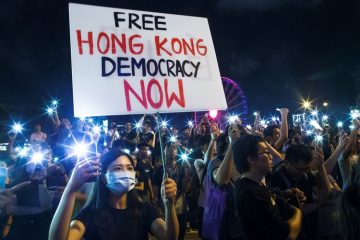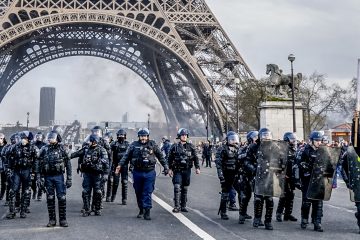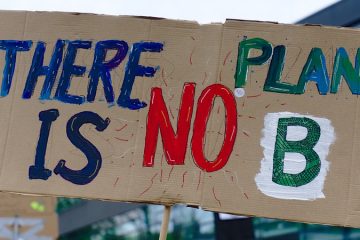
Can the Pro-Democracy Hong Kong Lobby Still Influence Western Foreign Policy?
During the 2019 Anti-Extradition Bill protests in Hong Kong, activists made extensive efforts to internationalize their movement, engaging in public diplomacy and lobbying foreign governments to support their cause. The Hong Kong pro-democracy lobby—a loose coalition of individuals and organizations aiming to steer Western foreign policy in a direction they believe will benefit Hong Kong’s democratic prospects—emerged amidst this unprecedented grassroots mobilization. Four years on, however, the Hong Kong lobby is facing an uncertain future. Activists are striving to overcome the barriers posed by transnational repression and reinvent their image in today’s fraught geopolitical landscape. Two factors explain the success of Hong Kong activists in constructing and consolidating their lobbying infrastructure in 2019. First, the expansion and transformation of the …
Lebanon in Free Fall: It May Get Worse Before It Gets Better
In October 2019, demonstrators took to the streets of Lebanon, chanting “all of them means all of them”— a cry for the entire government to resign. For the first time in years, the country witnessed the mobilisation of thousands of its citizens across every city. There were even Lebanese protests in major European cities and North America. Together, they formed a united front: citizens coming together regardless of religious affiliation, gender or age differences. Four months after the protests began, the country’s institutions are in shambles, a financial crisis worsens, and the media is in a near-total blackout. Unfortunately, Western attention has turned away from Lebanon. The situation, though, still warrants careful observation, as what happens next could mean a …
Protests in an Age of Globalization: Performance, People Power, and Pathos
Protest in an age of globalization relies on performance. From Hong Kong to La Paz and Santiago to Khartoum, global attention is increasingly captured by mass movements of people, demonstrating strength in numbers against prevailing political and economic systems. Modern protests, however, only work some of the time. Drawing on current events, scholars might consider a protest’s success hinging upon which audience they choose to target and the power of that audience to act. We see differences, for example, between Hong Kong — where protesters engaged the global community with limited effect thus far on Beijing — and protests in Sudan earlier this year — which targeted an old, autocratic leader’s military cadre, but did in fact precipitate a military coup. Has globalization changed protesting? Today’s global stage is nothing new — consider the nationalist movements …
Hong Kong: Have Protester Demographics Changed Following Escalating Violence?
As protests in Hong Kong have become more violent, have the demographics of the protesters changed? Political scientists have argued that a shift toward more violent protest action can alienate moderate protesters. Moderates, in this definition, are those who may share common cause with radicals (or those who embrace violent tactics) but reject those tactics. Once alienated, such moderate protesters tend to withdraw their support from a movement and may refrain from participating in protest action in the future. Hong Kong’s protests seem to have defied this trend. My surveys of protest participants find that the demographic profile of protesters has remained relatively constant even as violence has escalated in the demonstrations. Certain types of protesters who might be expected …
How the Recent Protest in Chile Legitimises the Historic Struggle of the Mapuche
Today is the 28th day of the mass protests that have gripped Chile; it is also the one-year anniversary of the killing of Camilo Catrillanca, a young Mapuche leader, by Chilean police. A year ago, popular mobilisation of the scale witnessed today in Chile seemed almost unimaginable, especially after I spent months in the Araucanía region in Southern Chile (or the Wallmapu to the Mapuche), where anything but the most innocuous collective organising has been heavily repressed. While simmering discontent was mixed with fear in the South, in the capital it seemed the frustrations of the student movement (see for example Donoso, 2013) and the return of the right-wing Sebastián Piñera to the presidency in 2018 made an eruption of …

Macron, the Yellow Vests and the Redemptive face of politics
On November 17th, 2018 large crowds began blockading roads around France dressed in the high-visibility yellow jackets that all French cars must store. Their initial demands focused on stopping a new fuel levy introduced to reduce carbon emissions and raise money for investments in renewables. However, this has not been the French government’s only problem: a recent survey has suggested the French are the most pessimistic people in Europe seeing little hope in the future either for themselves or the country, hate crime has risen dramatically, and, remnants of the Yellow Vests continue to organize violent demonstrations around the country. This toxic combination has left the government of Emmanuel Macron with little room to manoeuvre and, as his most recent …

‘You did not act in time’: Greta Thunberg and behavioural contestation
‘Basically nothing is being done to halt — or even slow — climate and ecological breakdown, despite all the beautiful words and promises’. Greta Thunberg’s damning speech before the UK parliament last month highlights that the greatest challenge to international climate agreements is inaction by governments. The Swedish climate activist’s central message was: ‘You did not act in time’. The norms within the Paris Agreement on climate change are challenged not just by climate change deniers and other open critics. Perhaps more dangerously, as Thunberg pointed out, they are also contested by states like the UK that pay lip-service to the agreement but fail to reach their emissions reduction targets. To capture these diverse forms of norm contestation, a collection of articles on ‘The dynamics of dissent’ in …









